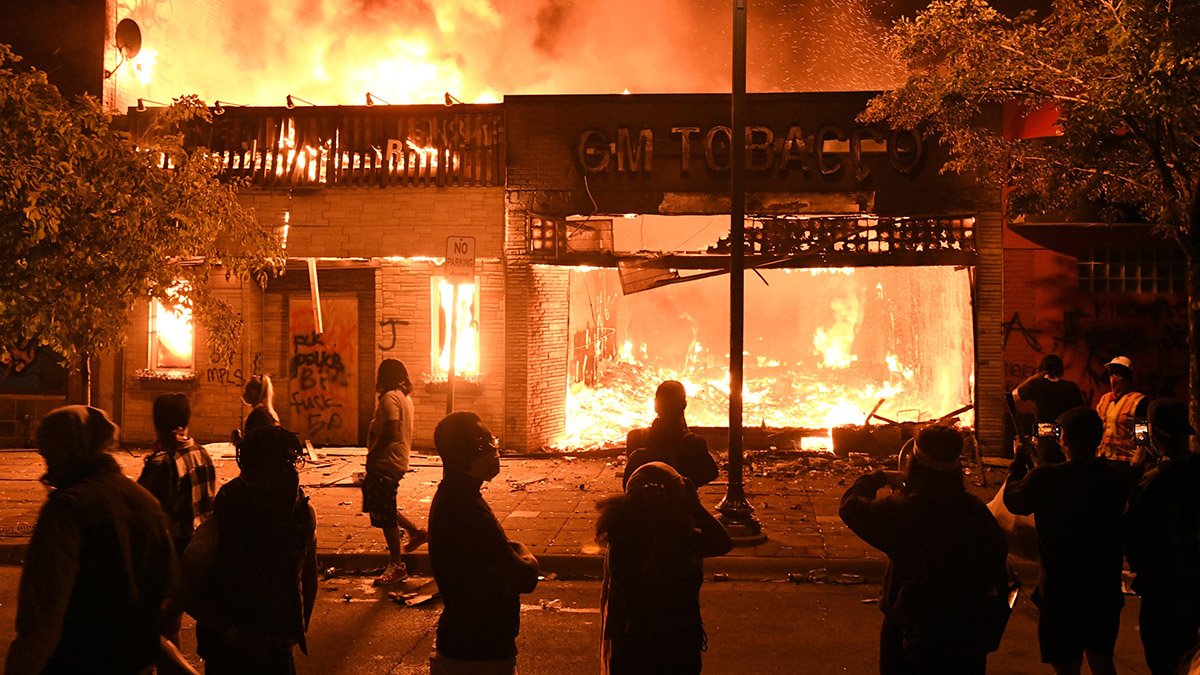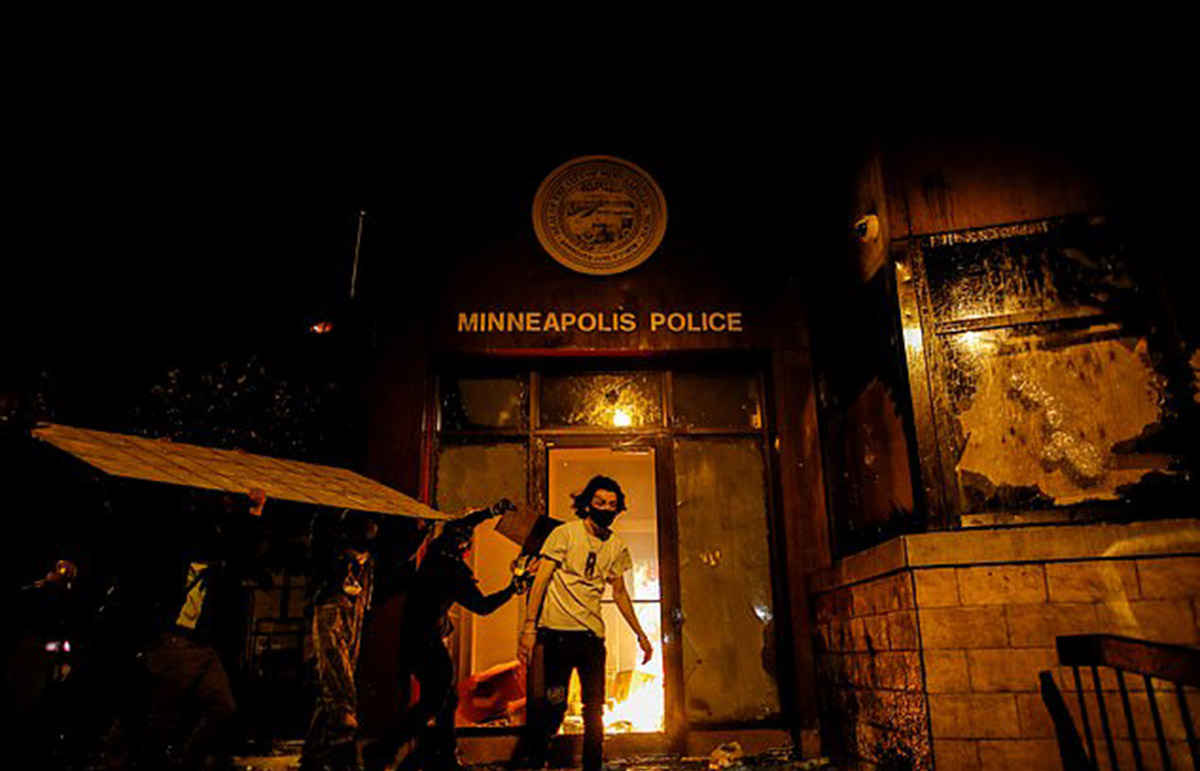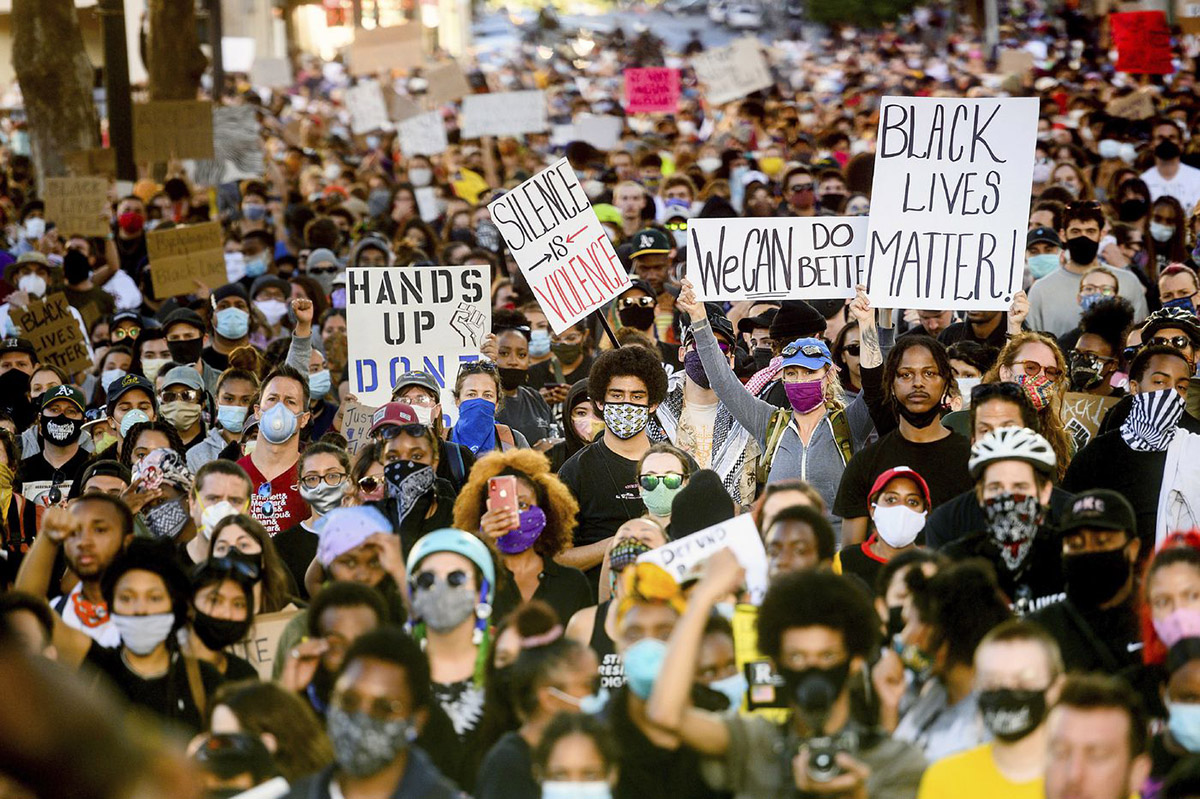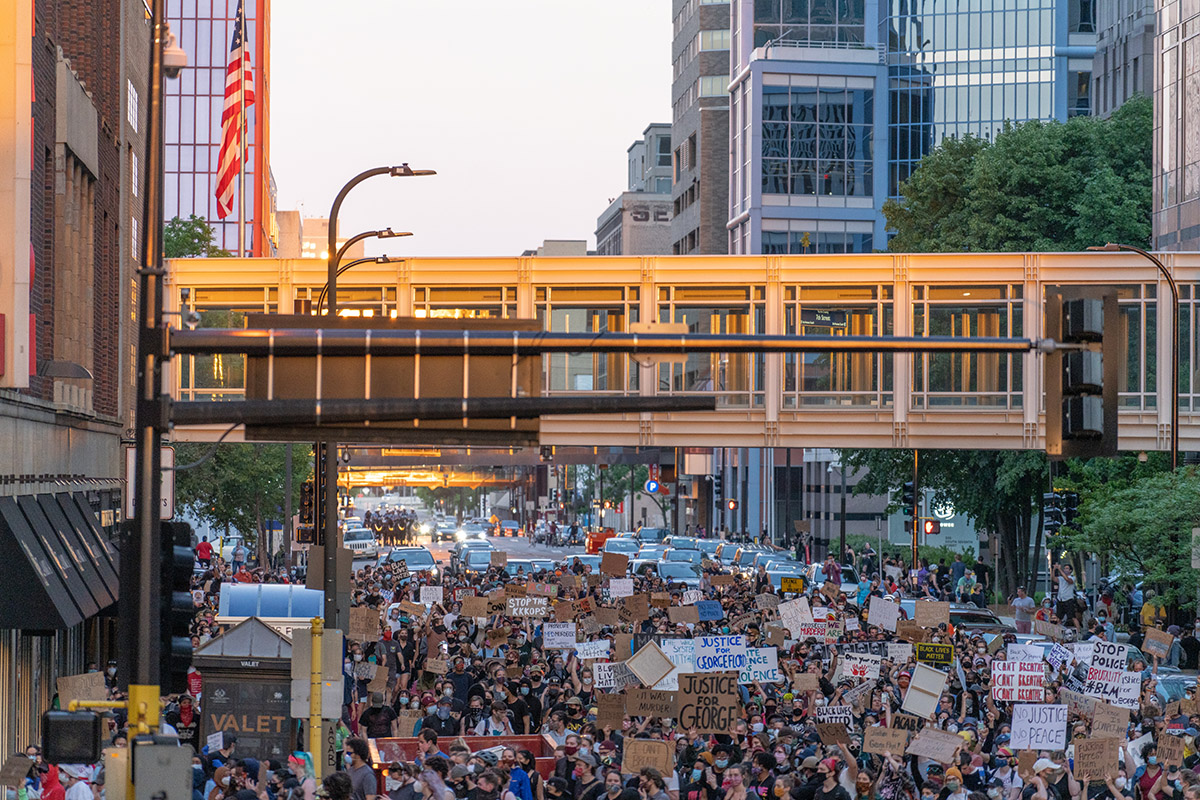Submitted by WA Contents
NOMA, AIA, NTHP and other institutions issue statements for racial injustice and solidarity
United States Architecture News - Jun 03, 2020 - 11:54 3105 views

The American Institute of Architects (AIA), the National Organization of Minority Architects (NOMA), the National Trust for Historic Preservation have issued statements for racial injustice and solidarity following the death of Minneapolis resident George Floyd in police custody on May 25 in the United States.
AIA and NOMA's statements followed the American Society of Landscape Architects and the American Planning Association's statements, whose statements have called the architecture profession and the world for "justice and equity in every community".
Starting from this weekend in Minneapolis, on May 26, streets, public spaces, parks, monuments have become the place of a wide-spread protests seeking justice over the death of George Floyd, and protests quickly spread in other cities of the United States. In the third night of protests, the protesters have burned the Minneapolis Police's 3rd Precinct.
Read the full statements of AIA, NOMA, NTHP, American Society of Landscape Architects and American Planning Association below:
American Institute of Architects
The American Institute of Architects (AIA) published a statement from AIA 2020 President Jane Frederick, FAIA:
"As Americans, we are mindful of this nation’s dark history of racial inequality. We are appalled by any actions that further threaten the universal respect and human dignity that everyone deserves. As architects, we remain committed to advancing civil rights protections, fair housing policies, and accessibility in the built world to help achieve the more perfect union we all seek. The fact is that architects and AIA, in our more than 160-year history, have not always felt compelled to share our perspectives. But the times we live in, the horrific nature of the events we witness, and the role we see for every member of our society demands that we speak out."

Protestors have burned the Minneapolis Police's 3rd Precinct. Image courtesy of Reuters.
National Organization of Minority Architects
NOMA National President Kimberly Dowdell published a statement on behalf of the National Organization of Minority Architects on May 31, 2020:
"The air in our nation is thick with a profound sense of grief and despair. Our collective air is so very thick that it’s literally hard to breathe. We struggle to grasp for air as we all navigate a global pandemic coupled with the deadly and pervasive virus called racism that has plagued America for over four centuries.
As the National Organization of Minority Architects (NOMA), we are calling on our members and our broader professional community to condemn racism and take an active role in eliminating the racial biases that account for a myriad of social, economic, and health disparities, and most importantly, result in the loss of human lives – Black lives. As architects, we are professionally responsible for protecting the health, safety and welfare of the public. The tragic execution of Black Americans at the hands of people infected by racism has plagued our nation for generations.
On this day 99 years ago, the racially motivated burning of Black Wall Street in Tulsa, Oklahoma claimed the lives of over 300 Black residents who were thriving independently in their own community. Just this week, our nation is grappling with the senseless murder of George Floyd, and all of the countless names of Black men and women who have recently lost their lives as a result of hatred, sparked by the color of their skin.
As architects, how can we protect the health, safety and welfare of the public if our country is not properly including Black Americans as full members of our society? Black Americans and other people of color have been subjected to injustice and inequality for far too long. NOMA was founded in Detroit by twelve Black architects in 1971 on the heels of one of the most racially challenging eras in American history. Born out of the Civil Rights Movement, NOMA was formed for the purpose of minimizing the effect of racism on our profession. Today, NOMA must call for more. As an organization, we must BE more.
Over NOMA's five decades of existence, we have borne witness to the seemingly endless tragedies perpetrated against Black Americans and people representing other communities of color. After careful consideration, NOMA has determined that this moment is ripe for us to take a far stronger stance. We have been advocating for justice throughout our history and now is the time to clearly articulate what matters to us the most.
Mission
Our existing mission is to champion diversity within the design professions by promoting the excellence, community engagement, and professional development of our members. While these issues remain important to us, we acknowledge that those words feel hollow in times such as this. Unfortunately, these trying times of racial unrest occur too frequently. While the recalibration of our mission has been in the works for quite some time, our national board has voted to enact NOMA's new mission statement, effective immediately:
NOMA's mission, rooted in a rich legacy of activism, is to empower our local chapters and membership to foster justice and equity in communities of color through outreach, community advocacy, professional development and design excellence.
To be clear, there is power in words and we did not simply rush to react to the current state of affairs. We have been in the process of adopting a new strategic plan for the past several months. In the near future, we will engage our local chapters to establish a revised set of aims and objectives to support our updated mission. NOMA's mission had not changed in over a decade, and we are doing so today in order to better equip our members to be the change that we seek to design for our society. We are taking a stand, and we hope that you will stand with us.
With just over half a year left of my two year term as NOMA's president, I am asking everyone to dig deep and help us battle the circumstances that not only result in racially motivated violence against people of color, but also prevent people of color from entering into and thriving in the profession of architecture. As a professional organization, our primary focus should be on supporting and serving our members. Right now, our members are hurting. This is traumatic. NOMA is here to address this pain in the best ways we know how. Before we can confidently advocate for greater economic opportunities for architects of color, we need to ensure that those very people are first able to breathe.
It so happens that my NOMA presidential platform for 2019-2020 is ALL in for NOMA. ALL is an acronym to promote diverse Access, Leadership and Legacy in the context of the profession of architecture. The other reason for using the word ALL is to signal that this is an effort that we need ALL people to join in. Broadly speaking, we should ALL be struggling to make sense of how our fellow humans are being mistreated. I encourage our White members and allies to take the lead in dismantling racism whenever you see it emerge.
B.R.A.V.E.
We must all leverage our positions of privilege to help our most vulnerable citizens, neighbors and colleagues strive for life, liberty and the pursuit of happiness. I urge you to consider what's happening right now as an American problem that we must all face together. Can we collectively be ALL in for NOMA? More importantly, can we all be BRAVE, as in committing ourselves to the list of items below for which BRAVE is an acronym?
If we can promote these basic ideas in our firms, our organizations and in our communities, our nation will be better for it. Perhaps then, we can all breathe a little bit easier. Only then, can we target our energy and creativity towards designing a better world for all.
In solidarity,
Kim

Image courtesy of WTOC, Live, Local, Now
American Society of Landscape Architects
Wendy Miller, the President of ASLA, shared a comment on behalf of that group's members:
"We are all horrified by the events that unfolded over the last several days. I am personally roiling with emotions, watching in real-time the injustices and inequitable treatment of people and communities who are in anguish because of centuries of racial discrimination. As landscape architects, we work to ensure that all persons have the right to equitable access to environmental and community benefits in the places they live, work, and learn. Now is the time for us to work to help ensure that these communities have fair and equitable treatment in all aspects of life."
American Planning Association
APA published a statement on Righting the Wrongs of Racial Inequality on May 31, 2020:
"The American Planning Association is heartbroken over the brutal, senseless killing of George Floyd in Minneapolis earlier this week, and the immense pain inflicted on the black community, which continues to suffer from the insidious and blatant effects of structural racism nationwide.
We are also profoundly saddened by the additional burdens being visited on our cities, which are still reeling from the devastating effect of a global pandemic, and concerned for the tens of thousands of planners across the nation who strive daily — despite setbacks and frustrations — to raise the voice of the voiceless.
The impact of Mr. Floyd's death and other recent grave injustices like it must be viewed in light of the historical trauma inflicted on African American communities, including discrimination wrought by the planning profession itself, which led to structural disadvantages in housing, transportation, education and employment that last to this day.
APA recognizes this reality and is working to center equity in all planning processes in keeping with our mission of creating great communities for all. From our landmark Planning for Equity Policy Guide, to the ethical principles that undergird the professional practice of planning articulated in the AICP Code of Ethics, to the new online public engagement toolkit to ensure that all voices are heard, we're working to help planners and others recognize and eradicate the bad policy decisions of the past.
Together we can take an active role in rebuilding and transforming communities to create a society that ensures safety, health and prosperity for all its inhabitants. APA will continue to develop and deliver tools, techniques, support and encouragement to planners tirelessly combating all forms of racism and inequity.
Let's stand in solidarity with communities of color nationwide at this painful time, moving beyond righteous anger and advocating for peaceful dialogue that educates and builds the bonds of great communities for all.
As we continue to grow and evolve in our work towards a more equitable future, we invite you to share your thoughts and feelings with us by email at [email protected]."

Protesters gather in downtown Minneapolis. Unrest in Minneapolis over the May 25th death of George Floyd. Image © Chad Davis from United States, CC BY 2.0. Courtesy of Wikipedia.
National Trust for Historic Preservation
National Trust President Paul Edmondson published a statement on death of George Floyd and the aftermath on May 30, 2020:
"Like so many others, I have been profoundly dismayed and deeply saddened at what is happening in our country. George Floyd’s horrific and inexcusable death in Minneapolis; the shooting of peaceful protestors in Louisville; the fomenting of violence; destructive outbreaks in cities across the country; and the politicization of what should have been a compassionate response by leaders in our society: I would like to think that America is better than this. It is evident, however, that we have a long way to go to ensure that justice and equity are applied to all Americans.
The National Trust for Historic Preservation has made a commitment as an institution to ensure that our own work reflects the equal value of every single American in our history and in our culture. A major reflection of that commitment is the African American Cultural Heritage Action Fund, created by the National Trust in response to the tragic events in Charlottesville in August of 2017.
We believe that historic preservation can play a critical role in acknowledging and healing the divisions in our nation, by telling the full story of our often-difficult history, by elevating and preserving the enormous and important contributions African Americans have made to our nation, and by carrying that powerful legacy forward through places of truth and reconciliation. We also believe that recognizing the dedication of communities of color to the American experiment through the places we work to save—from Rosenwald schools to the home of Madame C.J. Walker—will help to inspire innovation, investment, and faith in our democracy.
Each of us, in our own communities, businesses, and institutions at all levels, must commit to do all we can to create constructive spaces where justice and peace can flourish—including in those places that reflect our history as Americans. If we are successful, we will find our way to a more unified society, where outbreaks of pain and outrage will become only a thing of the past. We have much work to do in this country to acknowledge and shift a legacy begun hundreds of years ago, but I firmly believe we can find a way to healing and peace by respecting the humanity of every person, and by making that evident in the very fabric of our communities."
Top image: Protestors have burned the Minneapolis Police's 3rd Precinct. Image courtesy of CBC.
